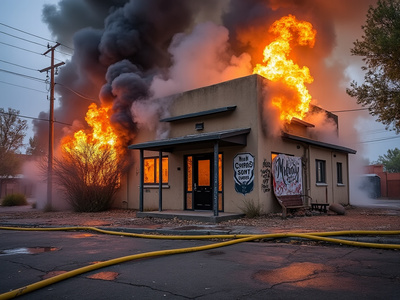
Russo-American Relations: Implications of Recent Developments in Ukraine and Military Collaboration in Europe
Exploring Russia's perspective on the recent rapprochement between the United States and European military alliances amidst ongoing tensions in Ukraine.
Recent geopolitical developments regarding Ukraine have underscored the changing dynamics in Russo-American relations, particularly in the context of the shifting U.S. administration's approach toward Russia and Europe.
In early March 2024, discussions regarding the potential for renewed dialogue between the United States and Russia occurred in conjunction with the U.S. commitment to reinforce military cooperation with European nations.
The current U.S. administration under President Trump aims to foster a new phase of engagement with Russia.
This initiative appears to coincide with a reassessment of military strategies within Europe that are directly responsive to ongoing conflicts in Ukraine.
As Western nations tighten their military collaborations, analyses suggest that this has accentuated Moscow's apprehensions regarding NATO's eastward expansion and its implications for regional security.
Russia's foreign policy has increasingly focused on countering what it perceives as Western encroachment in post-Soviet space.
The Kremlin's official stance on the renewed American overtures has been cautious, emphasizing that any diplomatic efforts should be underpinned by respect for Russia's national interests and security concerns.
Russian officials have indicated that they remain skeptical of U.S. intentions, citing previous instances where diplomatic negotiations did not yield the expected mutual benefits.
Additionally, the ongoing military conflict in Ukraine continues to act as a pivotal point in existing tensions.
Russia’s annexation of Crimea in 2014 and the ongoing conflict in Eastern Ukraine have been central to its geopolitical strategy.
The Kremlin has characterized NATO's military presence in Eastern Europe as a direct threat, which has, in turn, influenced its military posturing and strategic decisions in the region.
The evolving security situation has led to increased military exercises and deployments by NATO member states along the eastern flank, further complicating the already strained relations between the West and Russia.
Such military maneuvers have elicited strong responses from Moscow, which has undertaken significant military readiness initiatives in response.
In this complex landscape, the interactions between Russian leadership and the U.S. administration will likely play a crucial role in shaping future dialogue and potential conflict resolution efforts.
The global implications of these developments extend beyond Europe, affecting international security frameworks and diplomatic relations worldwide, as nations closely monitor the shifting balance of power.
In early March 2024, discussions regarding the potential for renewed dialogue between the United States and Russia occurred in conjunction with the U.S. commitment to reinforce military cooperation with European nations.
The current U.S. administration under President Trump aims to foster a new phase of engagement with Russia.
This initiative appears to coincide with a reassessment of military strategies within Europe that are directly responsive to ongoing conflicts in Ukraine.
As Western nations tighten their military collaborations, analyses suggest that this has accentuated Moscow's apprehensions regarding NATO's eastward expansion and its implications for regional security.
Russia's foreign policy has increasingly focused on countering what it perceives as Western encroachment in post-Soviet space.
The Kremlin's official stance on the renewed American overtures has been cautious, emphasizing that any diplomatic efforts should be underpinned by respect for Russia's national interests and security concerns.
Russian officials have indicated that they remain skeptical of U.S. intentions, citing previous instances where diplomatic negotiations did not yield the expected mutual benefits.
Additionally, the ongoing military conflict in Ukraine continues to act as a pivotal point in existing tensions.
Russia’s annexation of Crimea in 2014 and the ongoing conflict in Eastern Ukraine have been central to its geopolitical strategy.
The Kremlin has characterized NATO's military presence in Eastern Europe as a direct threat, which has, in turn, influenced its military posturing and strategic decisions in the region.
The evolving security situation has led to increased military exercises and deployments by NATO member states along the eastern flank, further complicating the already strained relations between the West and Russia.
Such military maneuvers have elicited strong responses from Moscow, which has undertaken significant military readiness initiatives in response.
In this complex landscape, the interactions between Russian leadership and the U.S. administration will likely play a crucial role in shaping future dialogue and potential conflict resolution efforts.
The global implications of these developments extend beyond Europe, affecting international security frameworks and diplomatic relations worldwide, as nations closely monitor the shifting balance of power.







